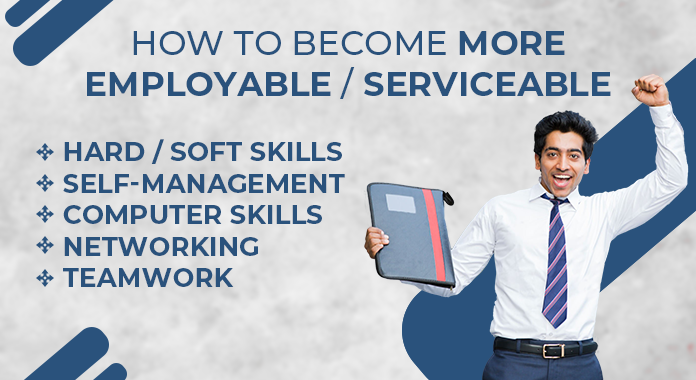Personality development plays an important role in shaping an individual’s career. As individuals go through professional environments, their personality traits heavily influence their interactions, decision-making processes, and overall success.
Emotional intelligence enables individuals to understand and manage their emotions, as well as those of others, facilitating conflict resolution and promoting healthy workplace relationships.
Adaptability allows professionals to embrace change, innovate, and thrive in dynamic work environments, crucial technological advancements and evolving industries.
Leadership qualities empower individuals to inspire, motivate, and guide teams towards shared common goals, promoting a positive organisational culture and driving success.
Moreover, traits like resilience, decisiveness, and integrity contribute to effective decision-making processes, enabling individuals to overcome challenges and uphold ethical standards.
Ultimately, a well-developed personality not only enhances an individual’s professional interactions but also positively impacts their confidence, resilience, and overall well-being, which are fundamental for sustained career growth and success.
Therefore, investing in personality development is indispensable for individuals aspiring to excel in their careers
What is Personality Development?
Personality development encompasses the continuous refinement and enhancement of one’s behavioural, emotional, and social attributes. It involves the cultivation of positive traits and the mitigation of negative ones to foster personal and professional growth.
Personality development is a lifelong journey of self-improvement, involving the effort to refine and enhance various aspects of one’s behaviour, emotions, and social interactions. It helps in the enhancement of positive traits such as empathy, resilience, assertiveness, and adaptability while addressing and mitigating negative tendencies like impulsivity, self-doubt, or defensiveness.
At its core, personality development is about becoming the best version of oneself, to evolve and grow both personally and professionally. It involves self-reflection, introspection, and a willingness to embrace change and constructive feedback. Through this process, individuals gain a deeper understanding of their strengths, weaknesses, values, and motivations, enabling them to make choices that align with their aspirations and goals.
Moreover, personality development promotes better relationships, effective communication, and emotional intelligence, enhancing one’s ability to connect with others, collaborate, and understand social dynamics. It empowers individuals to manage stress, face challenges, and adapt to evolving circumstances with resilience and grace.
In essence, personality development is a holistic attempt that not only shapes how we perceive and interact with the world but also determines our capacity for growth, fulfilment, and success in both personal and professional domains.
Role and Significance:
The role of personality development in career advancement cannot be ignored. A well-developed personality enhances communication skills, promotes leadership qualities, promotes adaptability, and cultivates a positive attitude—all of which are critical for success in today’s competitive workplace landscape.
Personality development plays a significant role in shaping an individual’s life, influencing their behaviour, choices, and interactions with others. It encompasses the gradual process of acquiring traits, attitudes, and behaviours that define one’s unique character. The significance of personality development lies in several aspects:
Self-awareness:
Understanding one’s strengths, weaknesses, values, and beliefs promotes self-awareness, enabling individuals to make decisions aligned with their goals and aspirations.
Interpersonal relationships:
A well-developed personality enhances communication skills, empathy, and conflict resolution abilities, facilitating healthier and better relationships with others.
Career success:
Employers often seek candidates with strong personalities characterised by traits such as confidence, resilience, and adaptability. Effective leadership, teamwork, and problem-solving skills are also byproducts of personality development, crucial for professional advancement.
Mental well-being:
A positive and resilient personality contributes to emotional stability, stress management, and overall psychological health. It helps individuals cope with challenges and setbacks, promoting a sense of fulfilment and satisfaction in life.
Societal impact:
Individuals with developed personalities are more likely to contribute positively to their communities, promoting cooperation, empathy, and social responsibility.
In essence, personality development is a lifelong journey that not only shapes individual lives but also influences broader societal dynamics, emphasising the importance of nurturing and honing one’s character traits for personal and collective growth.
Moreover, individuals with a strong personality are better able to handle challenges, resolve conflicts, and build healthy professional relationships, thereby increasing their effectiveness in achieving organisational goals.
Elements of Personality Development:
Several elements contribute to personality development, including self-awareness, emotional intelligence, communication skills, assertiveness, resilience, and adaptability. By focusing on these parameters, individuals can enhance their overall personality and increase their potential for career advancement. Personality development consists of various elements that contribute to an individual’s growth and effectiveness in both personal and professional spheres. The elements of personality development are mentioned below :
Self-Awareness:
Understanding one’s strengths, weaknesses, values, beliefs, and motivations is crucial for personal development. Self-aware individuals are better able to make better decisions, set realistic goals, and align their actions with their values, leading to greater authenticity and fulfilment.
Emotional Intelligence:
Emotional intelligence is the ability to recognize, understand, and manage one’s own emotions, as well as the emotions of others. Individuals with high emotional intelligence can understand interpersonal relationships effectively,can show empathy, resolve conflicts constructively, and maintain calmness in challenging situations.
Communication Skills:
Communication skills are crucial in any field. This includes not only verbal communication but also non-verbal cues, active listening, and the ability to convey ideas clearly and persuasively. Improving communication skills enhances one’s ability to express oneself, build rapport, and collaborate effectively with others.
Assertiveness:
Assertiveness involves expressing one’s thoughts, feelings, and needs in a direct and respectful manner, while also respecting the rights of others. Assertive individuals can set boundaries, negotiate effectively, and express themselves and their ideas without being aggressive or passive.
Resilience:
Resilience refers to the ability to bounce back from setbacks, adapt to change, and thrive in the face of hardships. Resilient individuals are able to maintain a positive outlook, learn from failures, and persevere in pursuit of their goals, even when faced with challenges or setbacks.
Adaptability:
In today’s dynamic world, adaptability is a key to success. Adaptability involves being open to change, flexible in approach, and able to adjust to new circumstances or environments. Adaptable individuals are quick to learn new skills, embrace innovation, and thrive in evolving situations.
Confidence:
Confidence is the belief in one’s abilities, worth, and potential for success. A healthy level of self-confidence enables individuals to take on challenges, take opportunities, and overcome self-doubt. Confidence also inspires trust and credibility, enhancing one’s influence and impact in professional settings.
By focusing on developing these elements of personality, individuals can enhance their overall effectiveness, resilience, and satisfaction in both their personal and professional lives.
Improvement Courses for Personality Development:
Personality development courses range from communication workshops and leadership training to emotional intelligence seminars and conflict resolution programs. Engaging in such courses provides individuals with valuable insights, tools, and techniques to enhance their skills and can promote their personal growth.
Conclusion:
In conclusion, personality development serves as an ultimate guide for a successful career. By investing time and effort in enhancing crucial personality traits, individuals can significantly enhance their professional prospects and open the doors of opportunities for advancement. Through continuous self-improvement and participation in personality development related courses, individuals can be able to learn that not only enhances their career but also enriches their overall quality of life.



